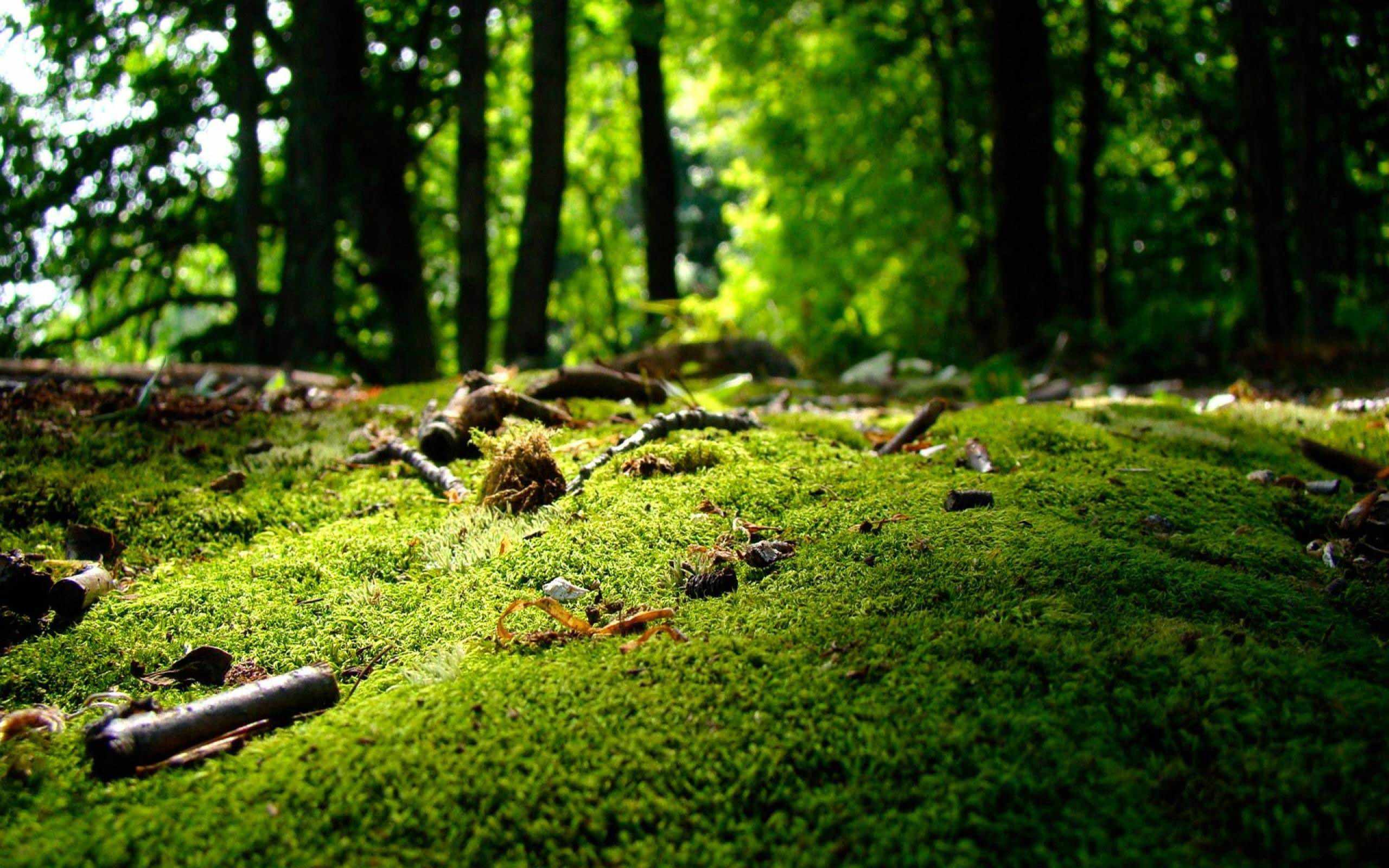Author:
Green Steps
Short summary:
Spending conferences not only in stuffy meeting rooms, but connecting participants deeply with the host location? Learn more about a community's local solutions and challenges in just one afternoon than you know about your own? Combine sustainable tourism with a pioneering educational method? Green Steps has demonstrated all of this with an interactive community walk in Ober-Grafendorf.

.png)
Transition Towns are not very well known in German-speaking countries, but have become synonymous with citizen-initiated sustainability movements in English-speaking countries since they were founded in 2005. From September 20-22, 2024 - as reported by the regional newspaper NÖN - Austrian, German and Swiss representatives of the transition movement met in the market town of Ober-Grafendorf for their annual conference. Around 80 participants exchanged views on the question of how to accelerate change towards sustainability.
The co-founder of the Transition movement and media figurehead, Rob Hopkins, attended the meeting in a live broadcast from his home town of Totnes in England and answered questions from members of various Transition Towns. Conference keynotes were given by the grand dame of Austrian landscape planning Gerlind Weber, the head of Sociocracy Training Barbara Strauch and the board member of Neustart Switzerland, Michael Baumgartner. The topic of in which spaces we should communicate with each other, how and about what, was thus placed at the center of the conference.
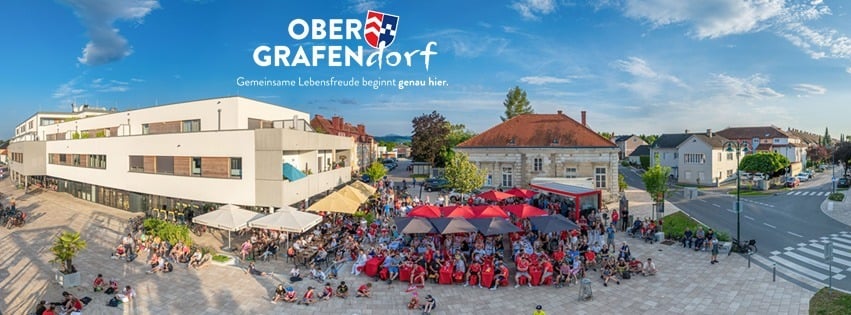
One area where people have to talk about issues that directly affect them, such as water supply, transport routes or education, is the municipality of Ober-Grafendorf. The Green Steps St. Pölten team therefore prepared a walk through the municipal area between May and September in cooperation with community workers in order to give participants a “different” conference experience.
The environmental education format “Big Friendly Giants”, which has already been implemented several times in St. Pölten, was adapted for Ober-Grafendorf: instead of just mapping old trees, flagship projects and problem areas were recorded as sights of a different kind in an interactive community walk in consultation with Mayor Rainer Handlfinger, landowner Ludovico Tacoli and farm manager Leo Bollwein.
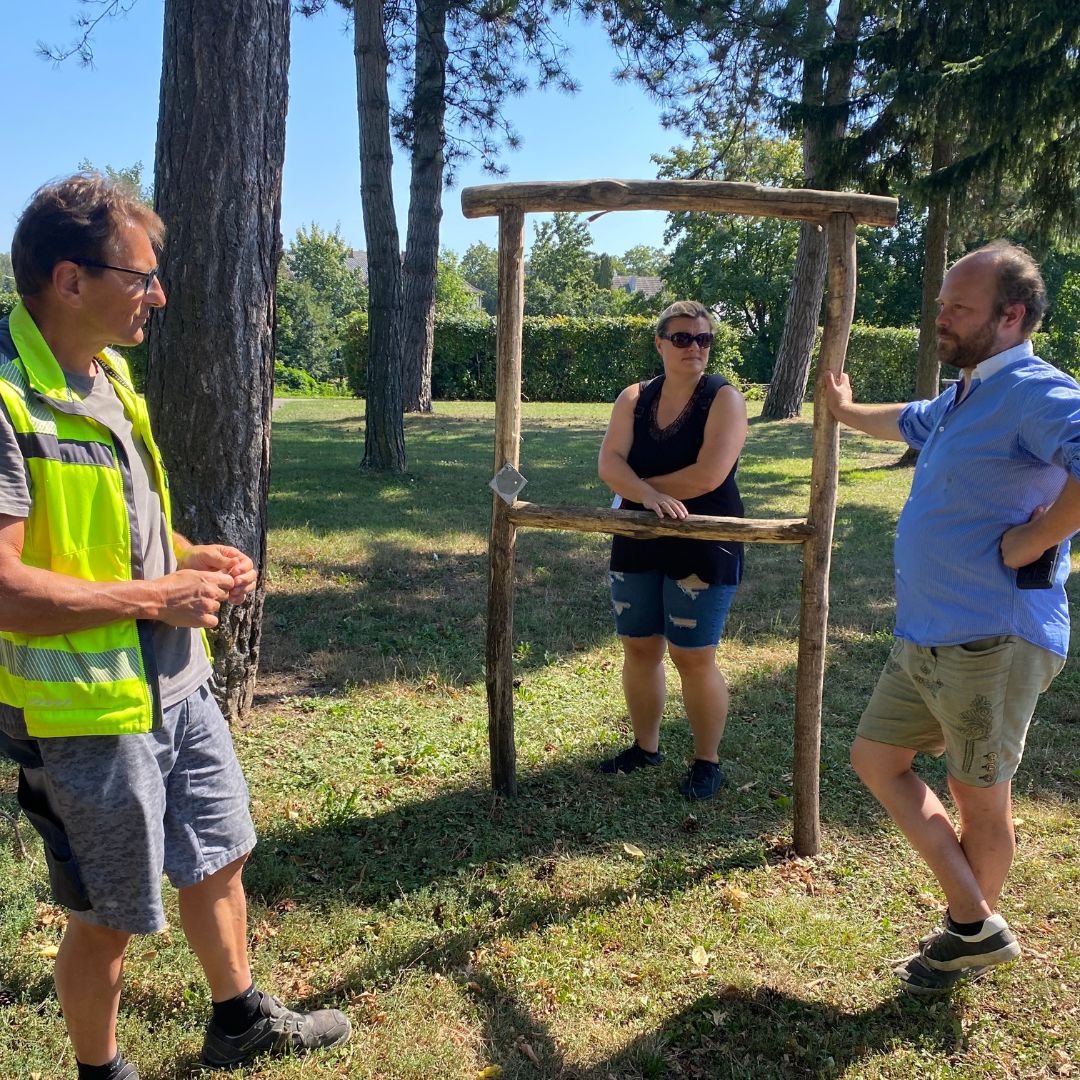
A 4.5-kilometre walk was created that gave conference participants a comprehensive understanding of the site in just three hours. 20 stations were equipped with interesting information boards explaining various topics of change such as regional economy, industrial landscaping, common areas, etc. using local points of reference. Multidimensional impressions were gathered during the tour and conclusions were drawn about experiences in the home community, which were discussed in a subsequent Q&A session with Rainer Handlfinger and Ludovico Tacoli.
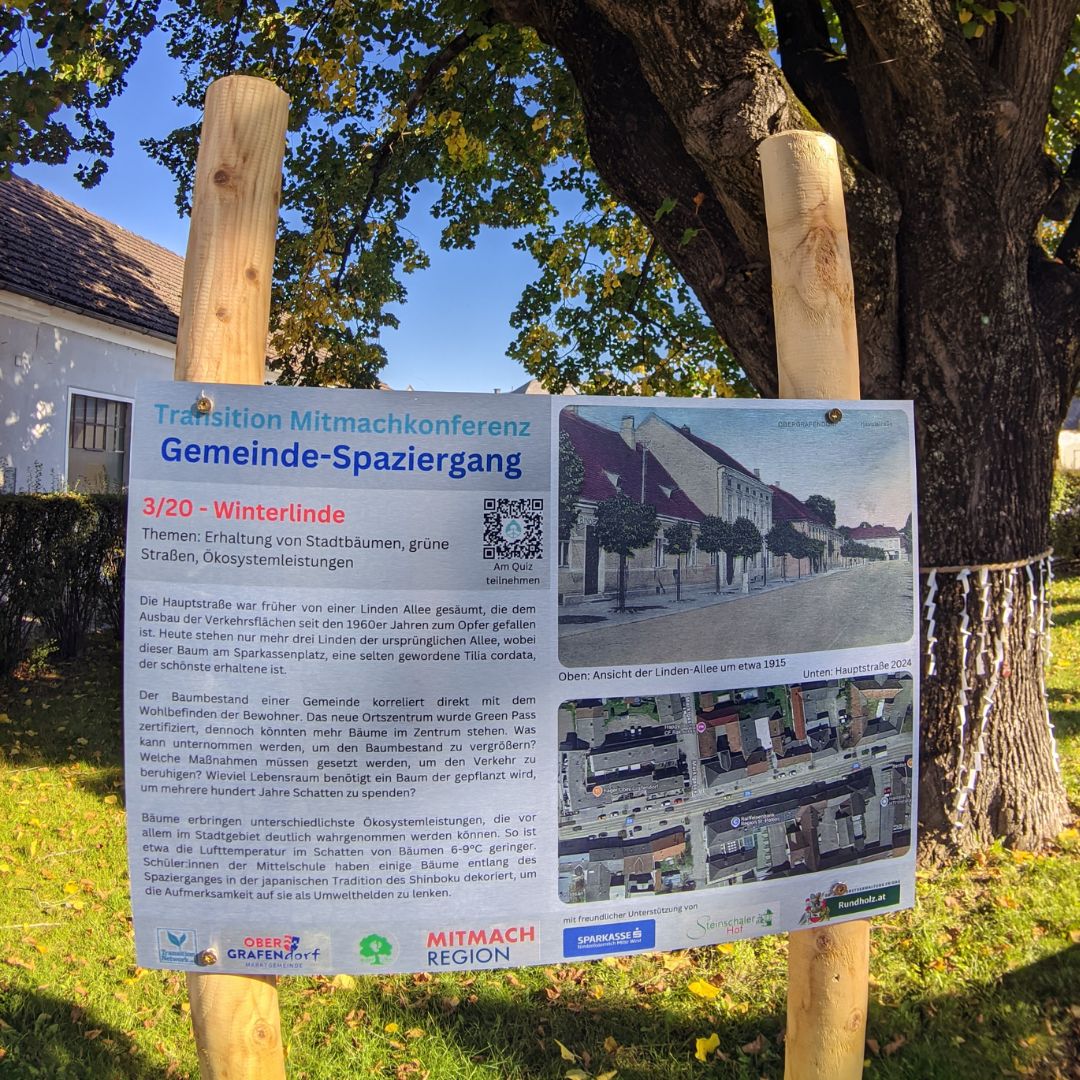
A cooperation with the Ober-Grafendorf secondary school involved the pupils from 3a, 3b and 3c in the project. They decorated several stations along the community walk by hanging trees with ropes and paper garlands and installing a dream wall on the community square. This also fulfilled one of Green Steps' central aims for the project, namely to motivate young people to actively shape the community. The project is to be continued at the secondary school.
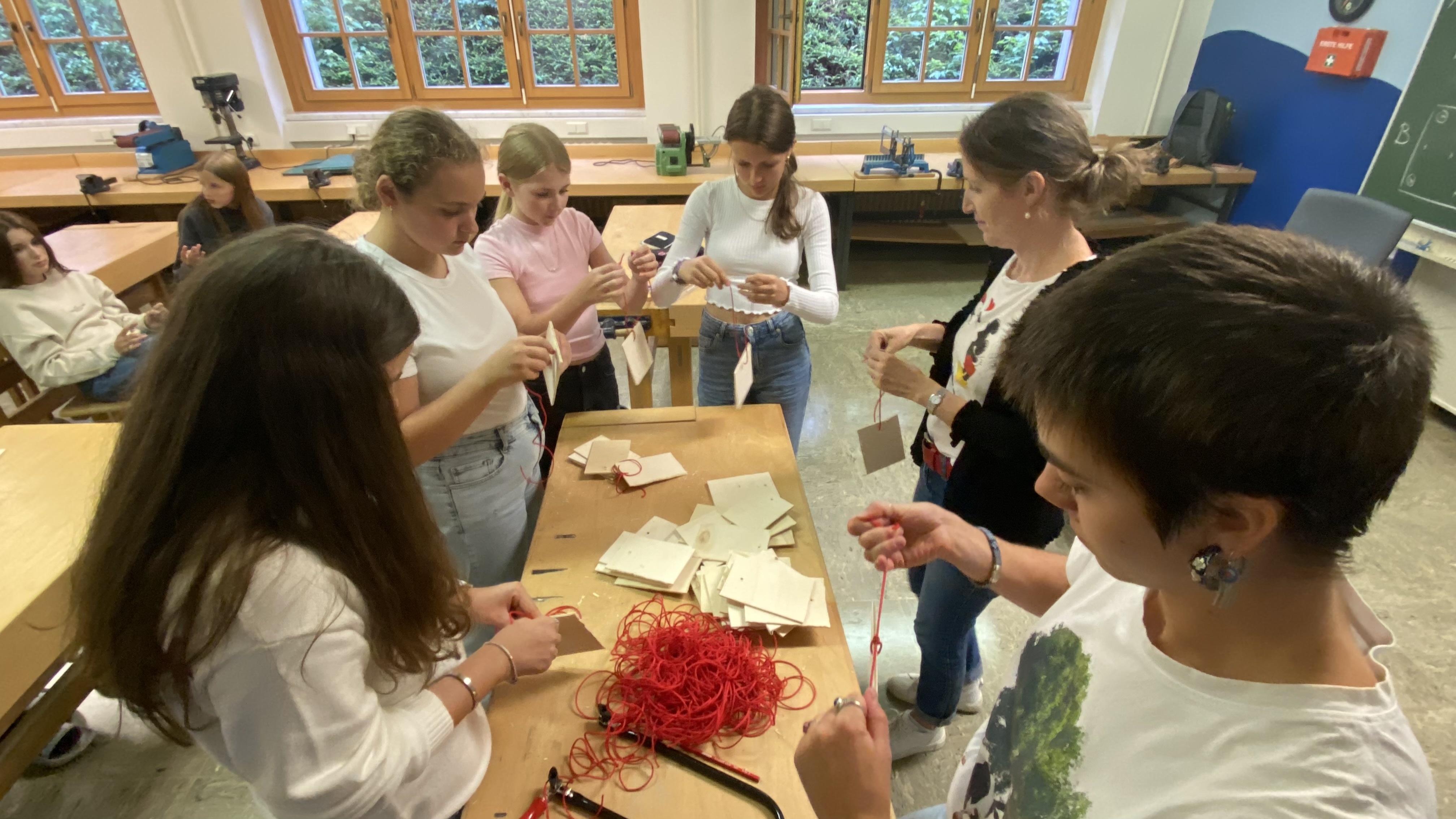
.jpg)
Walk the Talk
Hold conferences as a walk. Extend the classroom to the community. Why? Neuroscience has long shown that frontal teaching - whether during a conference or in the classroom - does not create lasting memories and systemic relationships are difficult to understand. Hiking through ecosystems, on the other hand, conveys - if such hikes are prepared in a pedagogically meaningful way - a profound understanding of the system and, as in the case of Ober-Grafendorf, an aha moment when global climate change can be linked to the industrial landscaping of our homes over the last 100 years.
Mobile Campus 4.0 as an education and tourism strategy to connect with the place
Green Steps extends the classroom and conference hall to the neighborhood, community and surrounding ecoregion with the Mobile Campus 4.0 educational format. A modular concept makes it possible to map natural and cultural waypoints and connect them in interactive walks. Each waypoint can have questions that participants answer either in geocaching mode or by scanning QR codes.
.jpg)
The St. Pölten pilot project already has over 30 such hiking routes. In June 2024, MS St. Georgen am Steinfelde and MS Ober-Grafendorf were connected by a Big Friendly Giants walk. Since the Transition Conference, Ober-Grafendorf now has its first route of its own, which informs tourists and schoolchildren about the municipality. All routes are digitally mirrored on a web app and connect participating communities in the Internet of Nature. This creates decentralized learning locations that allow us to learn what we need to know to combat climate change in our home town.
Daniel Wahl, the author of the book „Designing Regenerative Cultures“ recently gave an interview worth seeing about Reconnecting to Place for Planetary Health. The Mobile Campus 4.0, which is being implemented by Green Steps with the game Big Friendly Giants, is an educational strategy to anchor planetary health in education by turning the home into a place of learning.
Read more:
• https://www.noen.at/pielachtal/transition-austria-konferenz-in-ober-grafendorf-den-wandel-selbst-in-die-hand-nehmen-428806063
• https://www.noen.at/pielachtal/kommentar/kommentar-wandel-zum-grueneren-429021401
• https://transitionnetwork.org/about-the-movement/what-is-transition/#
• https://neustartschweiz.ch/Flyer_Auf_den_Boden_kommen.pdf
• Der Mobile Campus 4.0 als Bildungsstrategie zur Klimawandelanpassung
• Zur Skalierung von ortsbezogener Bildung durch den Mobile Campus 4.0
• https://www.danielchristianwahl.com/
• Reconnecting to place for planetary health
Interested in implementing the project in your home community?
• Founding a place of learning: https://ark.greensteps.me/communities
• Get to know the St. Pölten pilot project: https://ark.greensteps.me/commons/stp#quests
• Contact us on Whatsapp: https://chat.whatsapp.com/Lqc3gMYykWzDZcCwZKGYgd




